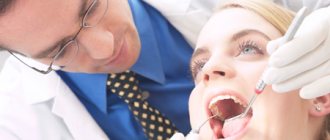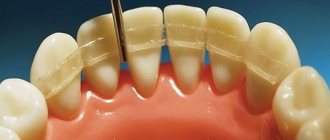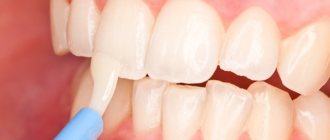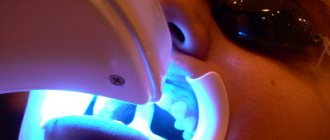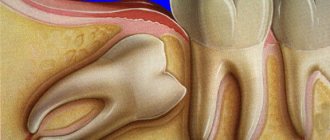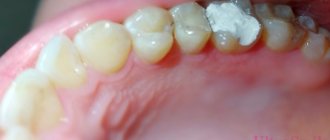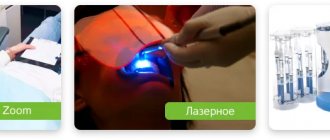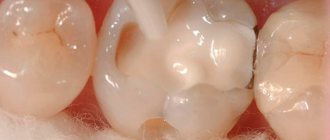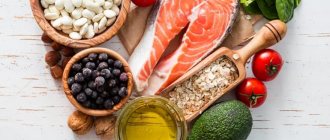Just a couple of centuries ago, dental problems were a relatively rare occurrence. The good ecology and natural nutrition of our recent ancestors contributed in the best possible way to the preservation of dentition, and only “bad” heredity or injuries forced us to seek medical help. Today, store shelves are literally bursting with oral care products. However, the queue to see the dentist is not decreasing, and his patients are becoming younger. What is the reason for such an unpleasant phenomenon?
Our contemporaries must be given their due - with all the variety of ways to maintain healthy teeth, we rarely use professional recommendations, leaving this issue to chance. The food we eat can be called healthy by a huge stretch, but its careful grinding and lengthy cooking make the food too soft. Even a salad of fresh vegetables in the hands of professional chefs turns into something light and airy, which does not require additional “teeth effort”. And, of course, a love for sweets that literally destroy tooth enamel and dental tissue.
All of the above has the most negative impact on the condition of the teeth. Rapid destruction, frequent loss, numerous diseases, pain and discomfort - almost every person is familiar with these unpleasant phenomena. But it's never too late to change your lifestyle and attitude towards your teeth! Pay attention to your diet, follow the recommendations of specialists and give up everything that poses a danger to your teeth - and you will be able to smile at your grandchildren with a Hollywood smile, and not show off the best examples of implants or denture designs.
Caring for your mouth in general
Remember that hygienic care is required not only for teeth, but also for gums, tongue, and the inside of the cheek. For this purpose, you can use a separate soft brush and clean the oral cavity completely. The condition of your teeth directly depends on the health of your gums. It is within your power to promptly remove pathogenic bacteria and massage your gums. It is not at all necessary to go for professional procedures; you can massage your gums at home using your fingers. This will significantly speed up the blood circulation process and prevent stagnation.
Consequences of neglecting hygiene
When a person eats, the acid-base balance of the oral cavity changes. There are always bacteria on the mucous membranes, but when the pH changes, favorable conditions arise for the proliferation of pathogens.
Bacteria combine with each other to form plaque on the teeth. In places where food particles remain, they multiply especially quickly. With subsequent meals, microbes receive additional portions of nutrients.
Their metabolic products contain acids that destroy tooth enamel. Caries develops - the most common dental disease. It is accompanied by decay processes and spreads deep into the teeth. As a result, carious cavities are formed.
The soft bacterial plaque becomes hard over time. Deposits form on the surface of the teeth and under the gums. Porous tartar is an excellent home for bacteria. Here they can multiply freely and poison surrounding tissues.
After some time, stomatitis develops, and gingivitis is inflammation of the soft tissues surrounding the teeth. The spread of inflammatory changes deeper leads to periodontitis (inflammation of the upper layers of bone and ligaments that hold the teeth), suppuration, and bleeding gums. Units become loose and may be lost.
Chronic foci of infection harm the body, causing pathologies of the nasopharynx and larynx. Living without teeth leads to gastrointestinal diseases. Pathologies of the digestive system have a bad effect on endocrine organs and metabolic processes, as a result of which the entire body suffers.
Choosing the right toothbrush and toothpaste
If you do not have problems with your teeth and gums, the best option is to use a brush with medium-hard bristles and use toothpaste without abrasive particles. If your teeth are prone to rapid tartar formation, dentists recommend giving preference to hard brushes. As for pasta, try to avoid little-known companies. Toothpastes with a whitening effect can be used no more than once a week. If you have problems with sensitivity or bleeding gums, choose suitable hygiene products.
If you follow all of the above measures in combination, you can maintain healthy teeth until old age.
It is important! Dental care rules
What is a healthy and beautiful smile? This is, first of all, the attitude of the person himself to his health and beauty, and only then the work of the dentist. You need to take care of your oral cavity from childhood. How to properly care for your teeth?
Dental care rules
1. Brush your teeth correctly. You need to brush your teeth at least 2 times a day, morning and evening before bed. You can brush your teeth both before and after meals. If you brush your teeth before meals, do it 15 minutes before meals so as not to spoil the taste with toothpaste, and after breakfast, rinse your mouth with water. You can add half a teaspoon of baking soda to the water or replace the water with mouthwash.
If you are a fan of brushing your teeth after eating, this is also great, because this way you will be sure that food debris will be removed and will save you from the need to rinse your mouth additionally. There is no right or wrong way. Choose the one that suits you. It doesn't matter when you brush your teeth, it matters HOW YOU do it.
2. Use dental floss. There is a huge selection of dental floss: round and flat, super-floss, flavored, fluoride-coated, etc. Of course, you make the choice yourself, but a dentist can help you with this. You need to floss once a day before going to bed, combining it with subsequent brushing of your teeth. The movement of the thread is made only along the axis of the tooth.
3. The right toothbrush. The toothbrush should have artificial bristle fibers. The head of the toothbrush should be approximately 2-2.5 teeth in length. The hardness of the bristles is selected by the dentist. If you don’t know which brush to choose, it’s better to take a medium hard one.
Why do children under 14 years of age have an increased risk of caries and pulpitis?
During the period of formation of a permanent dentition, when the child’s permanent teeth begin to erupt, there are 2 factors that increase the likelihood of developing dental diseases and parents need to take them into account.
- The anatomical features of “freshly erupted” permanent teeth contribute to the development of caries and its complications. The incompletely formed, delicate enamel of young permanent teeth, especially in the area of numerous fissures (grooves) on the chewing teeth, is very vulnerable.
- A psychological feature of the “difficult” transitional age, when it is not easy to persuade a child to brush his teeth correctly and thoroughly, and, even more so, to go to the doctor and cure caries in a timely manner, especially if the child is afraid of the dentist.
Know which oral hygiene is right for you
Investment in dental research is constantly increasing. There are new oral care products on the market, but it is important to use only the most suitable ones. There are four groups of patients:
- with a high risk of caries;
- with increased sensitivity;
- with the presence of dental plaque;
- with gum diseases.
A consultation with your dentist will help determine what products will be needed. Each toothpaste contains key ingredients specifically designed for a specific patient population.
Prevention
Many people know what preventive measures exist to preserve teeth. However, not everyone adheres to dentists' recommendations. To keep teeth and gums healthy until old age, oral hygiene alone is not enough. You should visit the dentist's office for a preventive examination at least 2 times a year. It is advisable for children to undergo a medical examination every 4 months. Preventive measures include all the recommendations described above, including professional teeth cleaning.
Professional teeth cleaning at the dentist
Professional dental hygiene will help you completely get rid of hard deposits. Only with the help of professional hygiene products and dental instruments is it possible to eliminate tartar, which not only worsens the appearance, but also contributes to the rapid development and spread of harmful bacteria.
Today, dentists can offer their patients different cleaning methods, but the most popular ones are the following:
- AirFlow. This technique is based on the use of three components: a stream of air, baking soda and a stream of water. It is absolutely safe, painless and can cope with deposits of any degree of complexity.
- Ultrasonic cleaning. This technique combines the use of ultrasound, which destroys plaque from the inside, but does not affect the enamel, as well as the effect of a jet of water, which quickly removes all remaining deposits.
- Laser cleaning. This is the latest method, which is based on the impact of a laser beam that evaporates all the moisture from the plaque, which causes layer-by-layer separation of deposits from the surface of the teeth.
Professional oral hygiene must be performed at least twice a year. This procedure does not take much time, is safe and painless. This type of cleaning has a positive effect on the entire oral cavity and significantly reduces the chances of developing dental diseases. It is also the best and most effective preventive measure possible.
Features of the structure of newly erupted permanent teeth in children.
As we have already said, newly erupted permanent teeth in a child have a number of anatomical features and differ from the teeth of an adult, namely:
- They have fragile, not fully formed and mineralized enamel.
- They have unformed roots that connect to the growth zone.
- The root canals of such teeth are wide, with a funnel-shaped expansion towards the root apex.
- The thin and fragile walls of the dental canals do not have secondary dentin; they are easily injured and destroyed.
- There is insufficient mineralization of dentin in the roots of the tooth.
Therefore, when treating pulpitis of permanent teeth in children, there are a number of limitations and features that the pediatric dentist knows and must follow. Endodontic treatment (root canal treatment) of permanent teeth in children is complex and requires great care.
By the way, for this reason, it is better for adolescent patients to contact a pediatric specialist rather than an adult dentist-therapist.
Teeth whitening in Ivanteevka
After professional hygiene, you can carry out a whitening procedure, which it is advisable to trust to experienced doctors in order to protect the enamel from destruction.
In modern dental clinics, specialists offer the following methods of teeth whitening:
- Photobleaching. This procedure is also called “light whitening.” This whitening is carried out using special solutions and gels activated by a special ultraviolet, LED, halogen or laser lamp.
- Laser whitening. The most gentle and safe way to whiten. The pigment is destroyed under the influence of hydrogen peroxide and a laser beam. Thanks to this, the whitening process occurs.
- ZOOM. This method is based on the photoactivation reaction of a gel containing carbamide peroxide and hydrogen peroxide. This method allows patients to whiten their teeth effectively and for a long time.
- Chemical whitening using the Opalescence system. This technique is based on the whitening properties of carbamide peroxide; the substance acts gently and safely, without irritating the gum mucosa at all.
There are many techniques that can restore your teeth to their natural whiteness, but only a professional can choose the right whitening option for you.
Using dental floss to keep your teeth healthy
To maintain healthy teeth, it is worth purchasing and learning how to use dental floss. Dental floss helps clean spaces between teeth where a toothbrush would never reach. Patients often wonder how to use dental floss? First you need to decide which thread you will need.
There are two types of threads:
- Standard floss;
- Thick floss (this thread is intended for patients with crowns or braces).
After selecting the floss, we begin to clean the spaces between the teeth using the desired floss. We position the thread vertically and insert it into the spaces of the teeth; be sure to remember that we do not insert the thread up to the gums. If the thread touches the gum, inflammation and bleeding may occur. After using the thread, be sure to rinse your mouth with mouthwash.
Regular visits to the dentist
It is worth visiting the dentist in a timely manner for several reasons:
- only a specialist will be able to determine the presence of caries or other serious diseases;
- a specialist will help you get rid of plaque and hard deposits that are no longer subject to a regular brush;
- The dentist, using special equipment, will conduct a full examination of the teeth and gum condition;
- a preventive examination will help to identify existing diseases in the early stages and treat them in a timely manner, which will help to avoid advanced stages;
Making an appointment with the dentist today will not require much effort from you, but will reliably protect you from many unpleasant health problems.
Protect your teeth from acids and sugar
Many things are detrimental to teeth, even what seems at first glance the healthiest food. Freshly squeezed fruit juices, for example, contain fruit acids that corrode enamel in concentrated form. What can we say about carbonated drinks! But there is nothing better for bacteria (and therefore worse for teeth) than sweet sucking candies - caramel, toffee, lollipops. When they stay in the mouth for a long time, this creates ideal conditions for the proliferation of pathogenic microflora.
But chocolate is much less dangerous for teeth. Its base ingredient, cocoa beans, contains substances that prevent the growth of bacteria. Therefore, the harmful effects of sugar, also included in chocolate, are neutralized by the action of these substances. True, dark chocolate made from natural cocoa beans is most beneficial for teeth.
Oddly enough, spicy foods are also good for teeth - they cause active salivation. Saliva washes the oral cavity, washing away food debris. In addition, saliva contains lysozymes - natural enzymes that destroy bacteria. Good for teeth and cheese. If you eat a piece of hard cheese after caramel, the effect of sugar will be neutralized.
In addition, cheese is a source of calcium, which is necessary for the entire body, including teeth.
Teeth darken from tea and coffee, and we are accustomed to considering these drinks harmful. But in fact, black tea perfectly strengthens tooth enamel and regulates the acid-base balance in the mouth. And natural coffee, brewed from roasted beans, has an antibacterial effect, destroying some microorganisms, including the main causative agent of caries - mutating streptococcus.
Don't skip brushing your teeth in the evening
Dental experts recommend brushing your teeth twice a day without skipping. You should especially not neglect brushing your teeth in the evening before going to bed. It is at night that bacteria are activated with renewed vigor. This happens because saliva is not produced as much at night. Saliva does not wash away all the bacteria in the mouth. So, if you don’t brush your teeth and remove plaque from your tongue before going to bed, bacteria and harmful microorganisms will actively multiply all night, which contributes to the destruction of enamel and gum disease.
Adjust the load on your teeth
Strong mechanical pressure destroys teeth, so forget about the Nutcracker's career. To crack nuts, there are special tongs, but your teeth have a different purpose. Even ordinary threads can cause tooth decay if you have the habit of constantly biting them with the same teeth, as some amateur dressmakers do.
The habit of clenching your teeth too hard, let alone grinding them, is dangerous: this leads to abrasion of the enamel. Sometimes this happens in a dream. But this case is not hopeless - there are special mouthguards that are put on the teeth before going to bed. They will protect. But the teeth and gums need feasible loads. Don’t be afraid to chew raw vegetables, and don’t try to unnecessarily chop and grind foods.
